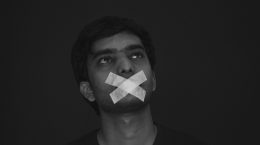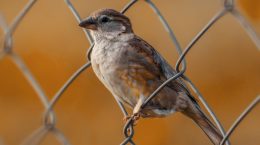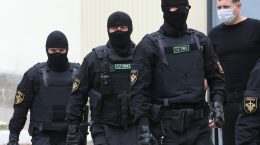In 2020, Belarusian journalists were attacked 477 times, 97 of them were serving administrative arrest. More than 60 journalists have suffered physically at the hands of security forces and some have even been deliberately targeted. All journalists collaborated with non-state media outlets. While members of the state-owned press who defend Lukashenka change their appearance and provide security if necessary, they are seen as victims in the current situation.
According to the report of the “Reporters Without Borders” organization, as of April 20, Belarus ranks 158th in the press freedom rating. Our country is the most dangerous for journalists in Europe. The report notes that “the state exercises full control over all TV channels. There are several independent media outlets, but many are forced to be based abroad, and the authorities continue to harass them.” There are 180 positions in the rating.[1]
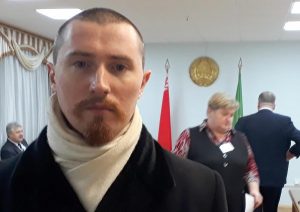 A new round of pressure on the independent press in Belarus began almost with the start of the election campaign. On June 10, 2020, the blogger of the YouTube channel “Gray Cat” Dmitry Kozlov was detained. The next day he was arrested for 20 days. He was supposed to be released on June 30, but he was left behind bars. Later it became known that he was charged under Part 1 of Article 342 of the Criminal Code (organizing or actively participating in group actions that grossly violate public order). Together with Pavel Sevyarynets, Evgeniy Afnagel, Maksim Vinyarsky, Pavel Yukhnevich and Andrei Voynich, he is involved in the case of “European Belarus”. Their trial will begin on May 12.[2]
A new round of pressure on the independent press in Belarus began almost with the start of the election campaign. On June 10, 2020, the blogger of the YouTube channel “Gray Cat” Dmitry Kozlov was detained. The next day he was arrested for 20 days. He was supposed to be released on June 30, but he was left behind bars. Later it became known that he was charged under Part 1 of Article 342 of the Criminal Code (organizing or actively participating in group actions that grossly violate public order). Together with Pavel Sevyarynets, Evgeniy Afnagel, Maksim Vinyarsky, Pavel Yukhnevich and Andrei Voynich, he is involved in the case of “European Belarus”. Their trial will begin on May 12.[2]
 On June 25, 2020, Igor Losik, a blogger and administrator of the “Belarus Brain” Telegram channel, was detained. He was charged under Article 342 of the Criminal Code (organizing and preparing actions that grossly violate public order, or actively participating in them). Since then, he has been in prison. In December, he was charged with preparation for a crime under Part 2 of Article 293 (participation in mass riots). On the same day, he went on a hunger strike, which he held for more than 40 days. Behind bars, Igor is being bullied, a lawyer was not allowed to see him, letters were not handed over, he was kept in an information vacuum. On April 20, the Ministry of Internal Affairs recognized the Telegram channel “Belarus Brain” as extremist.[3]
On June 25, 2020, Igor Losik, a blogger and administrator of the “Belarus Brain” Telegram channel, was detained. He was charged under Article 342 of the Criminal Code (organizing and preparing actions that grossly violate public order, or actively participating in them). Since then, he has been in prison. In December, he was charged with preparation for a crime under Part 2 of Article 293 (participation in mass riots). On the same day, he went on a hunger strike, which he held for more than 40 days. Behind bars, Igor is being bullied, a lawyer was not allowed to see him, letters were not handed over, he was kept in an information vacuum. On April 20, the Ministry of Internal Affairs recognized the Telegram channel “Belarus Brain” as extremist.[3]
In total, over 40 journalists were detained during the presidential campaign. Among them are correspondents of all-Belarusian publications (TUT.BY, Onliner, “Liberty Radio”, “New Time”, Euroradio), and journalists from the regions (“Strong News”, “Evening Bobruisk”, “First Region”, “Gantsavitski Time”). Particularly outrageous precedents are the arrest on July 15 live of “Liberty Radio” correspondent Anton Trofimovich, whose nose was broken by the security forces, and the arrest and subsequent beating of journalists from Gantsevichi Alyaksandr Poznyak and Syarhei Bagrov. Foreign media workers were attacked: Andy Smythe (BBC), Vladimir Kostin (Reuters), Natalya Fedosenko (TASS), Inna Kardash (112.ua). On July 21, 2020, more than 200 independent media journalists signed an appeal to the Minister of Internal Affairs, the Head of the Council of the Republic, the Prosecutor General and the Minister of Information. They demanded to stop pressure on the press and stop hindering the implementation of journalistic activities.[4]
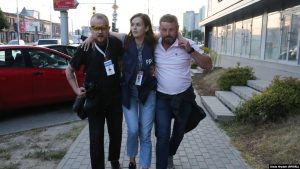 After the elections, attacks on journalists continued. Media workers suffered in almost every protest. On August 10, during coverage of a protest in Minsk near Kalvariyskaya Street, Natalya Lubnevskaya, a journalist of the “Nasha Niva” newspaper, was wounded. The security forces shot her in the leg with a rubber bullet. On the same day, a stun grenade exploded next to “Belsat” journalist Tatyana Kapitonova on Pushkin Avenue near the “Aurora” cinema. An employee of the TV channel was concussed.[5]
After the elections, attacks on journalists continued. Media workers suffered in almost every protest. On August 10, during coverage of a protest in Minsk near Kalvariyskaya Street, Natalya Lubnevskaya, a journalist of the “Nasha Niva” newspaper, was wounded. The security forces shot her in the leg with a rubber bullet. On the same day, a stun grenade exploded next to “Belsat” journalist Tatyana Kapitonova on Pushkin Avenue near the “Aurora” cinema. An employee of the TV channel was concussed.[5]
On September 1, at a protest march in Minsk, six journalists were detained: Maria Eleshevich, Nikita Nedoverkov and Svyatoslav Zorky (“Komsomolskaya Pravda”), Nadezhda Kalinina and Aleksey Sudnikov (TUT.BY), Andrei Shavlyugo (BelaPAN). They were doing their job – covering the action. But it appeared to the judges that media workers were co-ordinating the protests, inciting the marching in column. Each was sentenced to three days in prison. Three days later they were all released.[6]
On September 26, at the women’s march, “Belsat” journalists Maria Grits and Elena Dovnar were arrested. At home, Maria has a daughter who is not even two years old, but this circumstance did not prevent the security forces from detaining her. On September 28, it became known that she was fined 540 rubles. Elena Dovnar was sent to prison.[7]
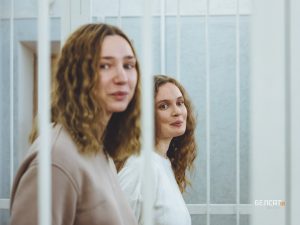 On November 15, 2020, “Belsat” journalists Katerina Andreeva and Daria Chultsova were detained. The girls were streaming from a protest in memory of Raman Bandarenka, who was killed by security forces. For more than five hours they showed people gathering, security forces approaching, riot police destroying the people’s memorial. Both received two years in prison. According to the judge, the journalists organized and participated in actions that grossly violate the order. Going out on the stream, they reliably knew about the unauthorized event and went out into the street, where they interviewed citizens and also commented on the events. Their actions led to disruptions in the work of public transport. The charge stated that they committed the crime with the help of a tripod, mobile phones, video cameras and vests with the inscription “Press”. Both were charged under Article 342 of the Criminal Code.[8]
On November 15, 2020, “Belsat” journalists Katerina Andreeva and Daria Chultsova were detained. The girls were streaming from a protest in memory of Raman Bandarenka, who was killed by security forces. For more than five hours they showed people gathering, security forces approaching, riot police destroying the people’s memorial. Both received two years in prison. According to the judge, the journalists organized and participated in actions that grossly violate the order. Going out on the stream, they reliably knew about the unauthorized event and went out into the street, where they interviewed citizens and also commented on the events. Their actions led to disruptions in the work of public transport. The charge stated that they committed the crime with the help of a tripod, mobile phones, video cameras and vests with the inscription “Press”. Both were charged under Article 342 of the Criminal Code.[8]
On December 22, 2020, security officials descended on “Press Club Belarus”, an educational platform for Belarusian journalists. Julia Slutskaya (founder of the “Press Club”), Sergei Olshevsky (director of the”Press Club”), Alla Sharko (program director of the “Press Club”), Pyotr Slutsky (employee of the “Press Club”), Ksenia Lutskina (former employee of the “Belarus 2” TV channel). They were charged under Part 2 of Article 243 (evasion of taxes and fees). The non-payment of taxes, according to investigators, concerns the “project of public television”, which the former journalists of state TV allegedly wanted to create on the base of the “Press Club”.[9]
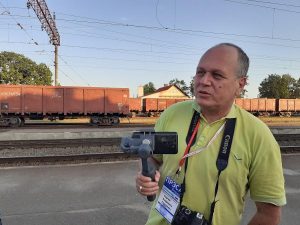 On December 25, Sergei Gordievich, a journalist of the regional portal “First Region”, was placed under house arrest. He is charged with a comment on social networks insulting Lukashenko (Article 368 of the Criminal Code), but he denies his guilt. Sergey Gordievich has been working in the editorial office since 2018, wrote about what is happening in the Drogichinsky district, made photo reports and videos. More than once he helped local residents to reach out to the authorities, and the authorities – to draw attention to the problems of the townspeople. Under house arrest, a journalist cannot use the telephone and the Internet, and therefore cannot work.[10]
On December 25, Sergei Gordievich, a journalist of the regional portal “First Region”, was placed under house arrest. He is charged with a comment on social networks insulting Lukashenko (Article 368 of the Criminal Code), but he denies his guilt. Sergey Gordievich has been working in the editorial office since 2018, wrote about what is happening in the Drogichinsky district, made photo reports and videos. More than once he helped local residents to reach out to the authorities, and the authorities – to draw attention to the problems of the townspeople. Under house arrest, a journalist cannot use the telephone and the Internet, and therefore cannot work.[10]
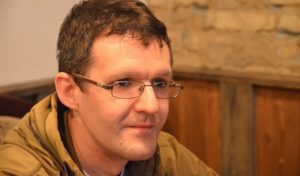 On March 12, journalist Denis Ivashin was detained in Grodno. He was suspected under Article 365 of the Criminal Code (interference in the activities of an employee of the internal affairs bodies). He worked in the InformNapalm investigative community and wrote for the “New Time” newspaper. An investigation has appeared on its pages about the employees of the Ukrainian “Berkut” who serve in the Belarusian police and are involved in dispersing peaceful protests. On March 11, Denis commented to the “Current Time” channel about his investigation, shared information from where he took the information, said that he had sent the collected data to the Ukrainian law enforcement agencies. Since Denis Ivashin has the status of a foreign Ukrainian, the country’s Ministry of Foreign Affairs reacted to his arrest. “This detention is of particular concern against the background of the ongoing attacks on freedom of speech, life and health of journalists in the Republic of Belarus. We demand that the consideration of Denis Ivashin’s case be transparent and impartial, and we continue to closely monitor every subsequent step of the Belarusian authorities towards him,” the appeal of the Ukrainian Foreign Ministry reads.[11]
On March 12, journalist Denis Ivashin was detained in Grodno. He was suspected under Article 365 of the Criminal Code (interference in the activities of an employee of the internal affairs bodies). He worked in the InformNapalm investigative community and wrote for the “New Time” newspaper. An investigation has appeared on its pages about the employees of the Ukrainian “Berkut” who serve in the Belarusian police and are involved in dispersing peaceful protests. On March 11, Denis commented to the “Current Time” channel about his investigation, shared information from where he took the information, said that he had sent the collected data to the Ukrainian law enforcement agencies. Since Denis Ivashin has the status of a foreign Ukrainian, the country’s Ministry of Foreign Affairs reacted to his arrest. “This detention is of particular concern against the background of the ongoing attacks on freedom of speech, life and health of journalists in the Republic of Belarus. We demand that the consideration of Denis Ivashin’s case be transparent and impartial, and we continue to closely monitor every subsequent step of the Belarusian authorities towards him,” the appeal of the Ukrainian Foreign Ministry reads.[11]
Regional journalists are also under threat. On March 19, a search took place at the house of a journalist from Klimovichi, Sergei Arzhantsev. He led the group “Klimavitskaya Staronka” in one of the social networks. It published local and republican news. After the search, the page with 1,700 subscribers had to be removed.[12]
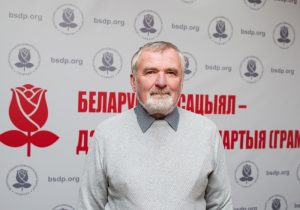 On March 22, Iosif Polubyatko, own correspondent of “Gazeta Slonimskaya”, was detained in Mosty. He went for questioning on a summons and never returned home. An hour later, the police came to his apartment with a search. The security forces took the computer system unit, mobile phone, scanner, and camera. The policemen explained that the arrest of the journalist related to publications in Telegram channels, but this application was not even installed on the phone or on the computer of the newspaper employee.[13]
On March 22, Iosif Polubyatko, own correspondent of “Gazeta Slonimskaya”, was detained in Mosty. He went for questioning on a summons and never returned home. An hour later, the police came to his apartment with a search. The security forces took the computer system unit, mobile phone, scanner, and camera. The policemen explained that the arrest of the journalist related to publications in Telegram channels, but this application was not even installed on the phone or on the computer of the newspaper employee.[13]
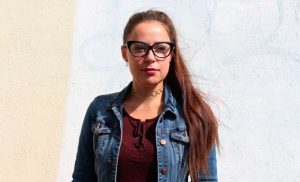 In April, the trial of Mogilev journalist Alina Skrebunova took place. The girl has been outside Belarus since March 7 due to criminal prosecution. In the first month of spring alone, she was fined 7,540 rubles. Another trial over her was held in absentia – she was accused of illegal production of media products, namely, that she gave an interview to the “Belsat” TV channel. Alina was fined 870 rubles.[14]
In April, the trial of Mogilev journalist Alina Skrebunova took place. The girl has been outside Belarus since March 7 due to criminal prosecution. In the first month of spring alone, she was fined 7,540 rubles. Another trial over her was held in absentia – she was accused of illegal production of media products, namely, that she gave an interview to the “Belsat” TV channel. Alina was fined 870 rubles.[14]
 On April 26, a trial was held against the editor-in-chief of the Baranovichi newspaper Intex-press Vladimir Yanukevich for “violation of the legislation on the media.” The newspaper published an interview with Svetlana Tikhanovskaya. The protocol said that in it Tsikhanouskaya “discredits and questions the legitimacy of the current President of the Republic of Belarus, pointing out that the elections in August were rigged.” The editor-in-chief did not admit his guilt, saying that the interview with Tsikhanouskaya was done at the request of the newspaper’s readers. The judge was interested in the words “regime” and “we must fight by all available means”, said by the leader of the opposition. Vladimir Yanukevich noted that this is her personal opinion, the word “regime” means any state power. And by fighting, we mean legal and peaceful measures for the transition to new elections. The lawyer noted that the criminal cases against Tsikhanouskaya do not deprive her of the right to speak in the media and do not deprive the media of the right to publish her opinion. The court found the editor guilty of disseminating information prohibited by law. Vladimir Yanukevich was ordered to pay a fine of 580 rubles. Administrative process has been started with regard to the editorial office.[15]
On April 26, a trial was held against the editor-in-chief of the Baranovichi newspaper Intex-press Vladimir Yanukevich for “violation of the legislation on the media.” The newspaper published an interview with Svetlana Tikhanovskaya. The protocol said that in it Tsikhanouskaya “discredits and questions the legitimacy of the current President of the Republic of Belarus, pointing out that the elections in August were rigged.” The editor-in-chief did not admit his guilt, saying that the interview with Tsikhanouskaya was done at the request of the newspaper’s readers. The judge was interested in the words “regime” and “we must fight by all available means”, said by the leader of the opposition. Vladimir Yanukevich noted that this is her personal opinion, the word “regime” means any state power. And by fighting, we mean legal and peaceful measures for the transition to new elections. The lawyer noted that the criminal cases against Tsikhanouskaya do not deprive her of the right to speak in the media and do not deprive the media of the right to publish her opinion. The court found the editor guilty of disseminating information prohibited by law. Vladimir Yanukevich was ordered to pay a fine of 580 rubles. Administrative process has been started with regard to the editorial office.[15]
On April 28, the Investigative Committee completed the consideration of the case of Sergei Tikhanovsky. The accused included not only the creator of the “Country for Life” channel, but also several bloggers. Artem Sakov was the channel operator. He was detained on May 31, 2020 in his own apartment. Russian Dmitry Popov moderated the social networks “Country for Life”. He disappeared on June 4, 2020, and soon it became known that he was arrested for 15 days. He was never released and was soon charged under Article 342 of the Criminal Code. The author of the YouTube channel MozgON Vladimir Tsyganovich was detained on June 9. On June 26 it became known that he was a suspect in the “Tikhanovsky case.” And in February, Vladimir Tsyganovich was charged under Article 293 of the Criminal Code. All the defendants were charged under Articles 293 and 342 of the Criminal Code, as well as 130 of the Criminal Code (distribution by a group of persons by prior conspiracy of materials aimed at inciting social hatred against government officials and law enforcement agencies). Sergei Tikhanovsky, Artem Sakov and Dmitry Popov were also accused of threats against the CEC chairman (Article 191 of the Criminal Code).[16]
ICCI “Our House” closely follows the history of every journalist who is behind bars due to the performance of his professional duty. We send letters to international organizations and European structures asking them to protect media workers. Since the beginning of the protests, we have helped at least four media workers and bloggers with paying fines, grocery baskets, and consultations. These are Ruslan K., Nikolay M., Olga T., Pavel S. We want them to be safe as soon as possible and to be able to tell people about what is happening without harm to their own lives.
[1]https://rsf.org/en/2021-world-press-freedom-index-journalism-vaccine-against-disinformation-blocked-more-130-countries
[2]https://news.tut.by/economics/728595.html
[4]https://news.tut.by/society/693334.html
[5]https://news.tut.by/society/696194.html
[6]https://news.tut.by/society/699266.html
[7]https://reform.by/167036-tri-zhurnalistki-ostajutsja-zaderzhannymi-posle-zhenskogo-marsha-v-minske
[8]https://news.tut.by/society/727472.html
[9]https://news.tut.by/society/728424.html
[10]https://1reg.by/2021/03/23/zhurnalist-v-nevole-kollegi-rasskazali-ob-arestovannom-v-drogichine-sergee-gordieviche/
[11]https://news.tut.by/society/722679.html
[12]https://t.me/belamova/16518
[13]https://belsat.eu/ru/news/23-03-2021-korrespondent-gazety-slonimskoj-ne-vernulsya-s-doprosa-v-militsii-v-ego-kvartire-proshel-obysk/
[14]https://news.tut.by/society/725276.html




